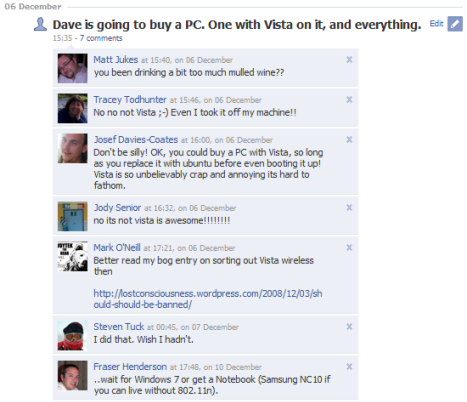Get posts sent to your inbox:
5 Different uses for RSS
RSS is a great technology, one of those that underpins the new usefulness of the web. It’s a simple way of keeping in touch with what is happening in lots of different places, without having to keep visiting lots of sites every day.
Here’s a video from those wonderful Common Craft folk explaining RSS better than I ever could:
One of the really fab things about RSS are the different uses to which it can be put. Here’s five off the top of my head – have you any others?
1. Keeping up with bloggers
I don’t think blogging would have taken off nearly as fast as it did without its very early adoption of RSS as a method of syndicating content. Blogs by their nature are updated on a regular basis, and in a lot of cases a lot more often than other more traditional sites. Keeping up with all that content would be impossible without a way of bringing all those updated into one place.
2. News to you
News site soon cottoned onto the potential of RSS, to the point where now any news organisation worth its salt provides content in this way. Other organisations are starting to adopt it as well, and government is getting there. The need to keep eyeballs on adverts has resulted in some feeds containing only teaser content, to force the reader to go to the originating site anyway. This is a Bad Thing, in my view, and the one positive thing that will come out of RSS feeds that include adverts in them is that it might mean we get rid of partial feeds.
3. Monitoring what’s being said
Now that search engines such as Google are providing RSS feeds for their alerts service – as well as Blogsearches – it makes it all the more easy to set up monitoring dashboards, rather like the ones developed by Steph Gray and others at DIUS. Scanning the web for mentions of key names and topics means that nothing on the web needs to be missed, no matter how small the source.
4. Chchchchchanges
Collaborating on wikis, and forums etc is a wonderful way to experience how the web can help bring people together to share and develop content together. But how to know when people have made updates to pages, or projects, or conversations? One way has always been to get email alerts, but that can lead to having a very full inbox. Any web service worth its salt these days provides RSS for updates, meaning you can keep yourself in the know, and well organised at the same time.
5. Republish, repurpose
This is the most exciting, for me. Because RSS is an open standard it means other services can make use of it to republish material in new ways. Take Steph’s digitalgovuk site – all built using the RSS feeds that Delicious spits out – or Simon Dickson’s OnePolitics – which makes following political blogs both easy and easy on the eye. When you start getting into the territory of combining RSS with other technology like maps and so on, the possibilities seem limitless.
What other uses for RSS are there that are important to you?

